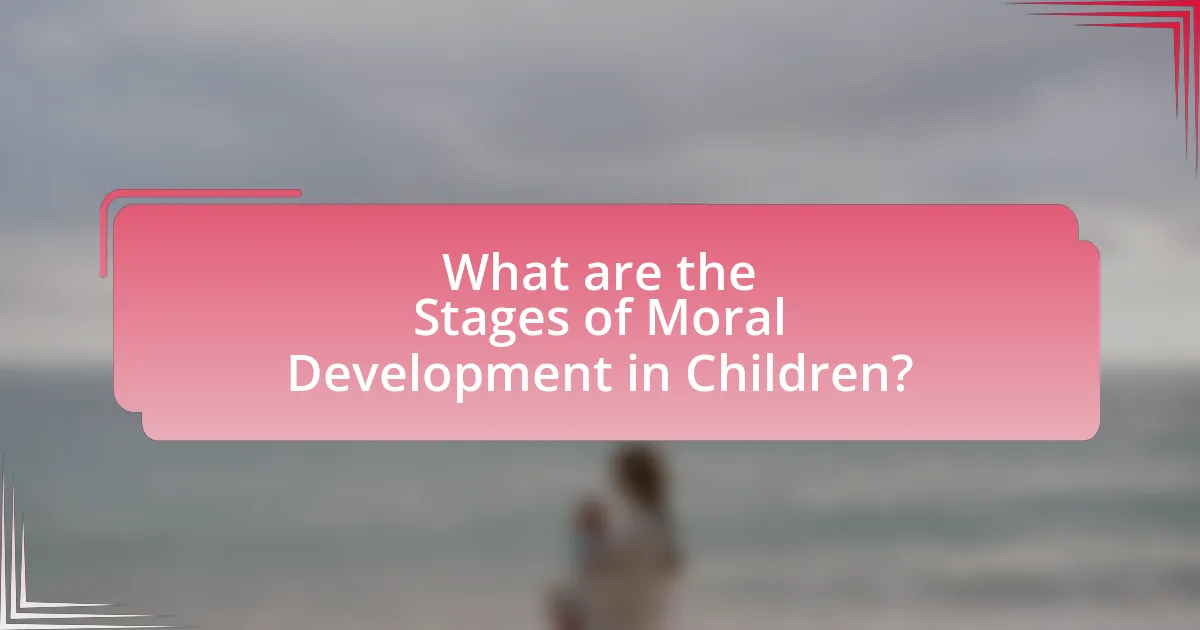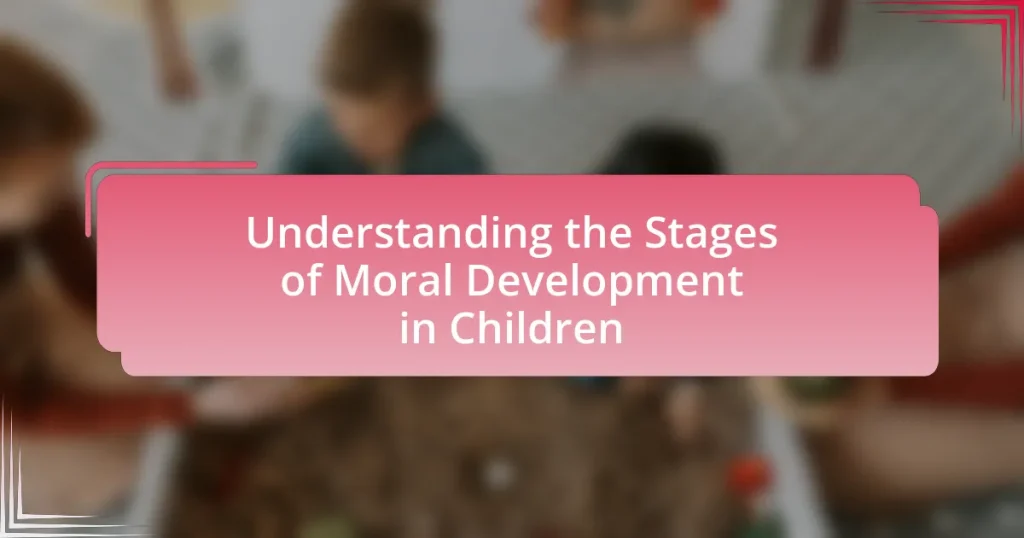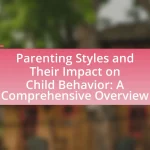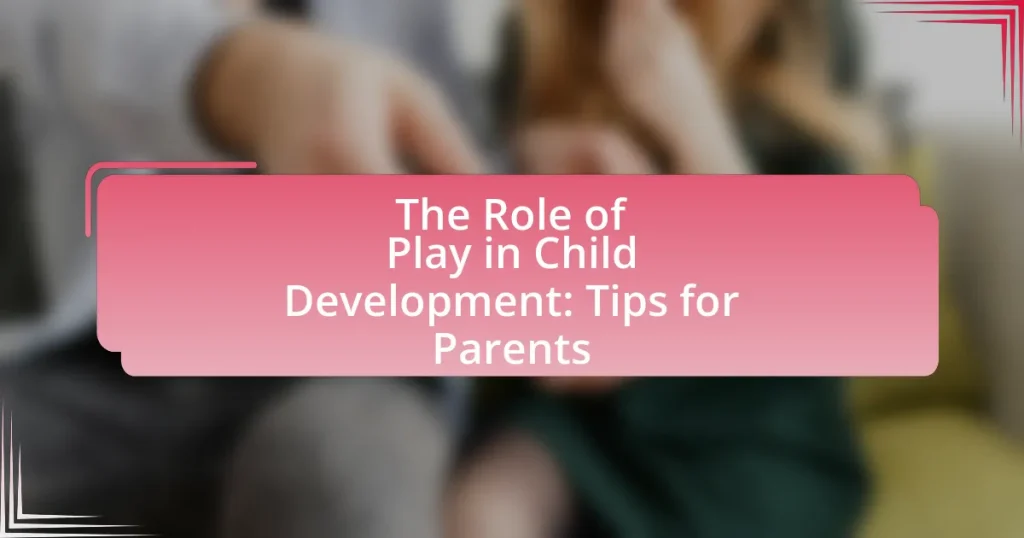The article focuses on understanding the stages of moral development in children, as proposed by psychologist Lawrence Kohlberg. It outlines three main levels: pre-conventional, where decisions are based on consequences; conventional, characterized by adherence to social norms; and post-conventional, where moral reasoning is guided by universal ethical principles. The article also discusses the origins of Kohlberg’s theory, its significance in shaping children’s behavior and social interactions, and strategies for parents and educators to support moral development. Additionally, it addresses challenges children face in moral reasoning and the importance of role models in fostering ethical behavior.

What are the Stages of Moral Development in Children?
The stages of moral development in children, as proposed by Lawrence Kohlberg, include three main levels: pre-conventional, conventional, and post-conventional. In the pre-conventional level, children make decisions based on the consequences of their actions, focusing on avoiding punishment and seeking rewards. The conventional level involves adherence to social rules and the expectations of others, where children value conformity and loyalty. Finally, the post-conventional level is characterized by the recognition of universal ethical principles, where moral reasoning is based on abstract reasoning and individual rights. Kohlberg’s theory is supported by longitudinal studies that demonstrate how children’s moral reasoning evolves through these stages as they mature.
How did the concept of moral development originate?
The concept of moral development originated primarily from the work of psychologist Lawrence Kohlberg in the 1950s and 1960s. Kohlberg built upon Jean Piaget’s earlier research on children’s moral reasoning, proposing a stage theory that outlines how individuals progress through different levels of moral understanding. His research involved presenting moral dilemmas to participants and analyzing their reasoning processes, leading to the identification of three main levels of moral development: pre-conventional, conventional, and post-conventional. This framework has been widely influential in both psychology and education, providing a structured approach to understanding how moral reasoning evolves throughout childhood and adolescence.
Who proposed the stages of moral development?
Lawrence Kohlberg proposed the stages of moral development. His theory, developed in the 1950s and 1960s, outlines a framework consisting of three main levels: pre-conventional, conventional, and post-conventional, each containing two stages. Kohlberg’s work is grounded in the belief that moral reasoning develops through a series of stages, which can be observed in children as they grow.
What are the key theories related to moral development?
The key theories related to moral development include Lawrence Kohlberg’s stages of moral development, Carol Gilligan’s ethics of care, and Jean Piaget’s theory of moral judgment. Kohlberg proposed a three-level framework consisting of six stages that describe how individuals progress from a pre-conventional level, focused on obedience and self-interest, to a post-conventional level, where moral reasoning is based on universal ethical principles. Gilligan critiqued Kohlberg’s model for its male-centric perspective and introduced an ethics of care approach, emphasizing relationships and compassion in moral reasoning. Piaget’s theory outlined two stages of moral development: the heteronomous stage, where children view rules as fixed, and the autonomous stage, where they understand the importance of intentions and the flexibility of rules. These theories collectively provide a comprehensive understanding of how moral reasoning evolves in children.
Why is understanding moral development important?
Understanding moral development is important because it informs how individuals distinguish right from wrong and guides their ethical behavior throughout life. This understanding helps educators and parents foster environments that promote moral reasoning and empathy in children, which are essential for social cohesion and personal integrity. Research by Lawrence Kohlberg, a prominent psychologist in moral development, outlines stages that children progress through, indicating that moral reasoning evolves with cognitive development. This framework allows for targeted interventions that can enhance moral education, ultimately leading to more responsible and ethical adults.
How does moral development impact children’s behavior?
Moral development significantly impacts children’s behavior by shaping their understanding of right and wrong, which influences their decision-making and interactions with others. As children progress through stages of moral development, such as those outlined by Lawrence Kohlberg, they begin to internalize societal norms and values, leading to more empathetic and socially responsible behavior. For instance, research indicates that children who reach higher stages of moral reasoning are more likely to engage in prosocial behaviors, such as sharing and helping others, as they understand the importance of fairness and justice. This correlation between moral reasoning and behavior is supported by studies showing that children with advanced moral development demonstrate greater self-regulation and lower instances of antisocial behavior.
What role does moral development play in social interactions?
Moral development significantly influences social interactions by shaping individuals’ understanding of right and wrong, which guides their behavior in social contexts. As children progress through stages of moral development, such as those identified by Lawrence Kohlberg, they learn to navigate complex social situations, empathize with others, and adhere to societal norms. For instance, children in the conventional stage prioritize social approval and the maintenance of relationships, which fosters cooperation and reduces conflict in peer interactions. Research indicates that children with advanced moral reasoning are more likely to engage in prosocial behaviors, such as sharing and helping, which enhances their social relationships and community involvement.

What are the specific stages of moral development?
The specific stages of moral development are defined by Lawrence Kohlberg and consist of three main levels: pre-conventional, conventional, and post-conventional, each containing two stages. In the pre-conventional level, Stage 1 focuses on obedience and punishment orientation, while Stage 2 emphasizes individualism and exchange. The conventional level includes Stage 3, which centers on interpersonal relationships and conformity, and Stage 4, which is about maintaining social order. Finally, the post-conventional level features Stage 5, which values social contracts and individual rights, and Stage 6, which is guided by universal ethical principles. Kohlberg’s theory is supported by extensive research, including longitudinal studies that demonstrate the progression through these stages as individuals mature cognitively and socially.
What are the characteristics of the pre-conventional stage?
The pre-conventional stage is characterized by a focus on self-interest and the consequences of actions. In this stage, moral reasoning is primarily based on avoiding punishment and seeking rewards. Children at this level make decisions based on the immediate benefits to themselves rather than considering societal norms or the welfare of others. This stage typically includes two sub-stages: obedience and punishment orientation, where actions are judged by their direct consequences, and individualism and exchange, where children recognize that different individuals have different perspectives and interests. These characteristics are foundational in Lawrence Kohlberg’s theory of moral development, which outlines how moral reasoning evolves through distinct stages.
How do children reason in the pre-conventional stage?
Children in the pre-conventional stage of moral development reason primarily based on the consequences of their actions, focusing on avoiding punishment and seeking rewards. This stage, as defined by Lawrence Kohlberg, typically occurs in children aged 4 to 10 years. During this phase, children evaluate their behavior in terms of immediate outcomes rather than societal rules or ethical principles. For example, a child may refrain from stealing a cookie not because they understand it is wrong, but because they fear being scolded. This reasoning reflects a self-centered perspective, where moral decisions are made based on personal gain or loss rather than a broader understanding of right and wrong.
What are examples of behavior in the pre-conventional stage?
Examples of behavior in the pre-conventional stage include obedience to avoid punishment and self-interest to gain rewards. In this stage, children make decisions based on the immediate consequences of their actions, such as following rules to avoid being scolded or sharing toys to receive praise. Research by Lawrence Kohlberg, who developed the stages of moral development, indicates that children in this stage focus on direct outcomes rather than societal rules or ethical principles.
What defines the conventional stage of moral development?
The conventional stage of moral development is characterized by an individual’s adherence to societal norms and the expectations of others. In this stage, individuals prioritize maintaining social order and gaining approval from peers and authority figures, often evaluating actions based on their impact on relationships and societal rules. This stage typically occurs during adolescence, as described by Lawrence Kohlberg in his theory of moral development, where moral reasoning is based on conformity and the desire to uphold laws and rules for the sake of social harmony.
How do societal norms influence the conventional stage?
Societal norms significantly influence the conventional stage of moral development by shaping individuals’ understanding of right and wrong based on social expectations. During this stage, typically occurring in adolescence, individuals begin to internalize the values and rules of their community, leading them to prioritize conformity and the approval of others. Research by Lawrence Kohlberg, who developed the stages of moral development, indicates that individuals at this stage are motivated by the desire to maintain relationships and uphold societal standards, which are often dictated by cultural norms. For example, adolescents may refrain from cheating not only due to personal ethics but also to align with the expectations of peers and authority figures, demonstrating the direct impact of societal norms on moral reasoning.
What are typical behaviors exhibited in the conventional stage?
In the conventional stage of moral development, typical behaviors include adherence to social norms, valuing relationships, and seeking approval from authority figures. Children in this stage often prioritize conformity and loyalty, demonstrating a strong sense of duty to family, friends, and society. They may exhibit behaviors such as following rules, respecting laws, and showing concern for others’ feelings, as these actions align with societal expectations. Research by Lawrence Kohlberg, who proposed the stages of moral development, supports these observations, indicating that individuals in the conventional stage focus on maintaining social order and gaining acceptance within their community.
What is the post-conventional stage and its significance?
The post-conventional stage is the highest level of moral development in Lawrence Kohlberg’s theory, characterized by individuals making decisions based on universal ethical principles and personal conscience rather than societal rules. This stage signifies a shift from external authority to internal moral reasoning, where individuals prioritize justice, rights, and the greater good over conformity to laws or social norms. Research indicates that only a minority of adults reach this stage, highlighting its significance in fostering critical thinking and ethical decision-making in complex situations.
How do individuals reason in the post-conventional stage?
Individuals in the post-conventional stage reason based on abstract principles and values rather than concrete rules or laws. This stage, as defined by Lawrence Kohlberg, involves moral reasoning that prioritizes justice, individual rights, and the greater good over societal norms. For example, individuals may challenge laws they perceive as unjust, demonstrating a commitment to ethical principles that transcend specific legal frameworks. Research indicates that this stage is characterized by a focus on universal ethical principles, such as human rights, which can lead to moral dilemmas where individuals must weigh conflicting values.
What are the implications of reaching the post-conventional stage?
Reaching the post-conventional stage of moral development implies that individuals prioritize universal ethical principles over societal norms. At this stage, individuals recognize the importance of justice, human rights, and equality, leading to moral reasoning that transcends specific laws or rules. Research by Lawrence Kohlberg, who developed the stages of moral development, indicates that individuals in this stage are capable of critical thinking and can evaluate the morality of laws based on their alignment with ethical principles. This advanced moral reasoning fosters a sense of social responsibility and encourages individuals to advocate for social change when they perceive injustice, demonstrating a commitment to the greater good.

How can parents and educators support moral development?
Parents and educators can support moral development by modeling ethical behavior and providing opportunities for children to engage in discussions about values and ethics. Research indicates that children learn moral values through observation and imitation; therefore, when adults demonstrate fairness, empathy, and respect, children are more likely to adopt these behaviors. Additionally, creating an environment that encourages open dialogue about moral dilemmas helps children develop critical thinking skills related to ethics. Studies show that children who participate in discussions about moral issues are better equipped to navigate complex social situations and make ethical decisions.
What strategies can be used to encourage moral reasoning in children?
To encourage moral reasoning in children, strategies such as engaging them in discussions about ethical dilemmas, modeling moral behavior, and providing opportunities for community service can be effective. Engaging children in discussions about ethical dilemmas helps them to think critically about right and wrong, fostering their ability to reason morally. Research indicates that children who participate in discussions about moral issues develop a deeper understanding of ethical principles (Kohlberg, 1981). Modeling moral behavior by adults demonstrates the importance of ethical actions, as children often imitate the behavior of role models. Additionally, providing opportunities for community service allows children to experience the impact of their actions on others, reinforcing the importance of empathy and social responsibility. These strategies collectively enhance children’s moral reasoning skills and contribute to their overall moral development.
How can discussions about moral dilemmas aid development?
Discussions about moral dilemmas aid development by enhancing critical thinking and ethical reasoning skills in children. Engaging in these discussions encourages children to analyze complex situations, consider multiple perspectives, and articulate their values. Research by Lawrence Kohlberg, a prominent psychologist in moral development, indicates that such dialogues promote higher stages of moral reasoning, allowing children to progress from a focus on obedience and punishment to understanding social contracts and universal ethical principles. This progression is essential for developing empathy and moral judgment, which are crucial for social interactions and personal growth.
What role do role models play in moral development?
Role models significantly influence moral development by providing examples of ethical behavior and decision-making. Children observe and imitate the actions of role models, which shapes their understanding of right and wrong. Research indicates that children who have positive role models are more likely to develop empathy, altruism, and a strong moral compass. For instance, a study by Bandura (1977) demonstrated that children learn behaviors through observation, highlighting the importance of role models in instilling moral values.
What common challenges do children face in moral development?
Children commonly face challenges in moral development such as understanding complex moral dilemmas, differentiating between right and wrong, and navigating peer influence. These challenges arise as children progress through various stages of cognitive and emotional growth, where they must reconcile personal beliefs with societal norms. Research indicates that children often struggle with moral reasoning due to limited life experiences and cognitive development, which can hinder their ability to apply moral principles consistently. For instance, studies show that children may exhibit moral reasoning that is heavily influenced by authority figures or immediate consequences rather than a deeper understanding of ethical principles.
How can conflicts between peer influence and moral values be addressed?
Conflicts between peer influence and moral values can be addressed through open communication and critical thinking. Encouraging children to articulate their values and the reasons behind them fosters self-awareness and resilience against negative peer pressure. Research indicates that children who engage in discussions about moral dilemmas are better equipped to navigate conflicts between their peers and their personal ethics. For instance, a study published in the Journal of Moral Education found that children who participated in moral reasoning exercises demonstrated a stronger ability to resist peer pressure and adhere to their moral beliefs.
What are the signs of delayed moral development in children?
Signs of delayed moral development in children include difficulty distinguishing right from wrong, lack of empathy, and challenges in understanding social rules. Children exhibiting these signs may struggle to take responsibility for their actions, show little remorse for wrongdoing, and have trouble forming healthy relationships with peers. Research indicates that these behaviors can stem from inadequate socialization experiences or environmental factors, which hinder the development of moral reasoning skills. For instance, studies have shown that children who are not exposed to consistent moral guidance may demonstrate a slower progression through established moral development stages, as outlined by theorists like Lawrence Kohlberg.
What practical tips can parents use to foster moral development?
Parents can foster moral development by modeling ethical behavior, encouraging empathy, and discussing moral dilemmas. By demonstrating honesty, fairness, and respect in their own actions, parents provide a clear example for children to emulate. Encouraging empathy involves helping children understand and share the feelings of others, which can be achieved through discussions about emotions and perspectives. Additionally, discussing moral dilemmas allows children to think critically about right and wrong, enhancing their moral reasoning skills. Research indicates that children who engage in discussions about moral issues develop a stronger sense of morality and ethical understanding.















